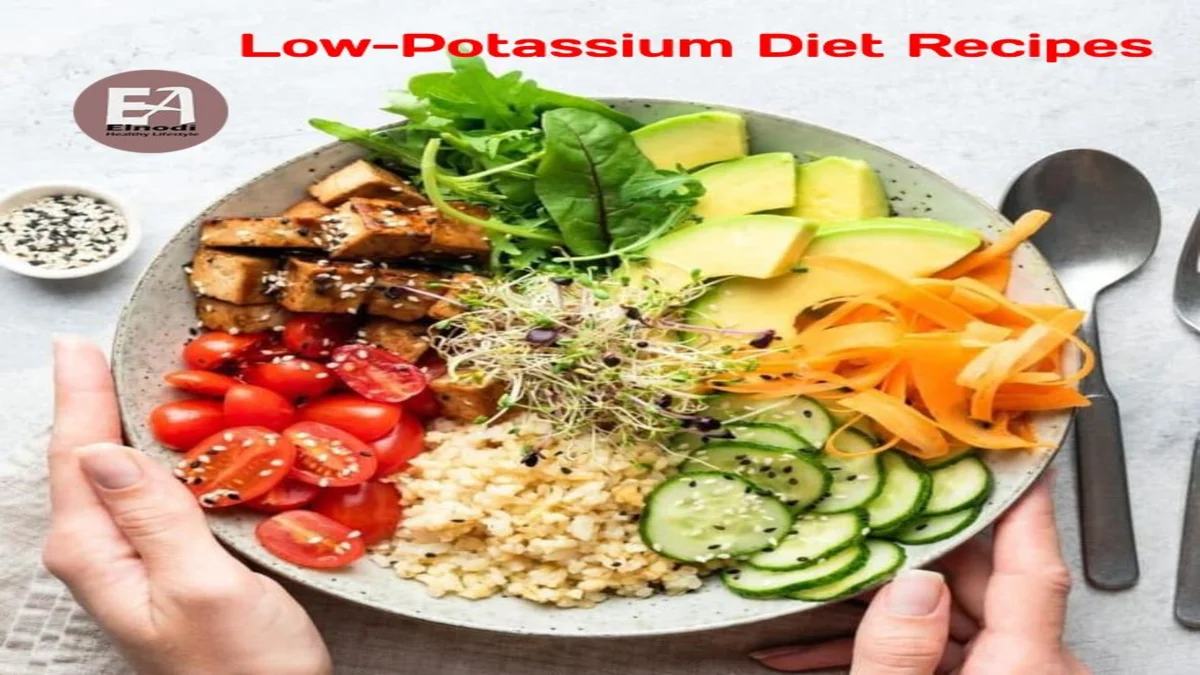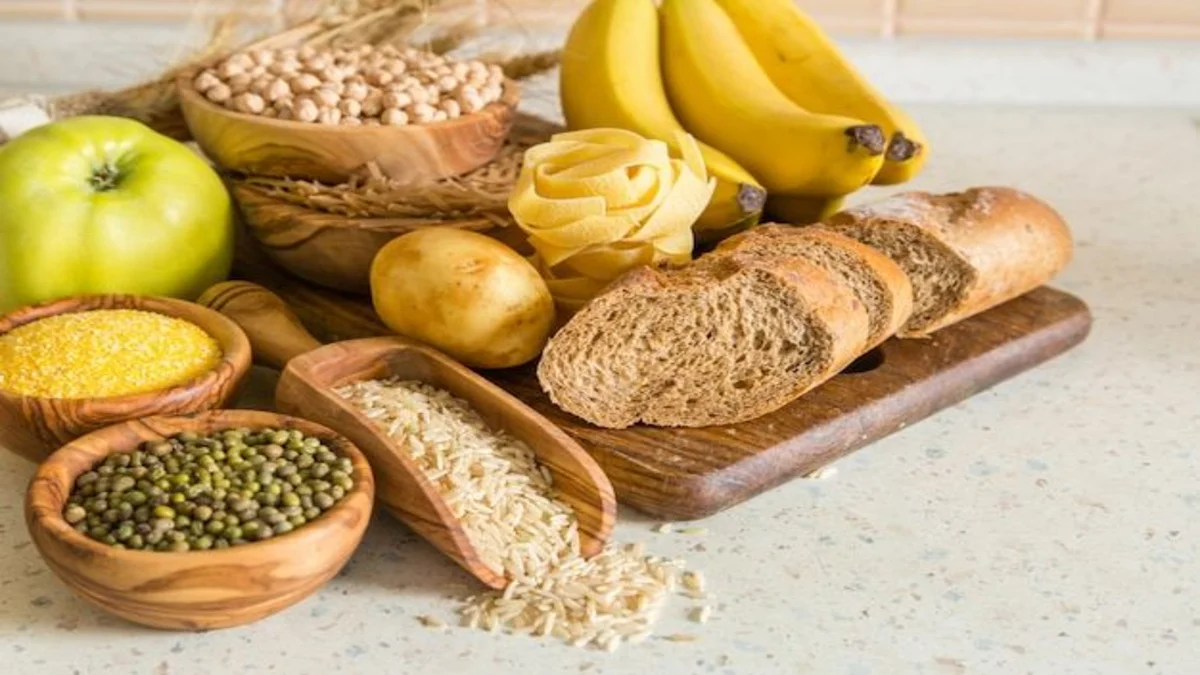Are you looking for delicious and creative recipes that are low in potassium? Low-potassium diet recipes can be challenging, especially when you want to keep your meals flavorful and exciting. But don’t worry, we’ve got you covered.
For individuals with certain health conditions, such as kidney disease, a Low-potassium diet is essential to maintain proper kidney function. However, sticking to bland meals can make it difficult to stay on track with your dietary restrictions.
Benefits of Low-Potassium Diet
Consuming a diet low in potassium can both treat and prevent hyperkalemia. A tiny blood sample is drawn from a vein to determine the potassium level. Potassium typically has a normal range of 3.8 to 5 mEq/L. Dangerous levels are those that are higher than 6 mEq/L or lower than 3 mEq/L.
A low-potassium diet may offer several benefits, including:
Blood Pressure Management: Cutting back on potassium intake can help lower blood pressure in those who have high blood pressure.
Kidney Health: To avoid consequences like hyperkalemia, patients with kidney issues, such as chronic kidney disease, frequently need to restrict their potassium consumption.
Heart Health: By lowering the risk of arrhythmias and other cardiovascular problems, lowering potassium consumption may promote heart health.
Bone Health: Unbalances in electrolytes, such as potassium, can result from some medical disorders, such as kidney disease. Appropriate bone density can be maintained by controlling potassium consumption.
Muscle Function: Potassium is essential for the proper operation of all muscles, including the heart muscle. On the other hand, elevated potassium levels can cause paralysis or at least muscle weakness. Diets low in potassium can help avert these problems.
Management of Certain Medications: Certain drugs, such as ACE inhibitors and some diuretics, can raise the body’s potassium levels. A low-potassium diet may be used in conjunction with these drugs to help avoid potassium accumulation.
Reduced Risk of Hyperkalemia: A low-potassium diet may be beneficial for those who are at risk of developing hyperkalemia, a disorder marked by elevated potassium levels in the blood, to avoid the problems that come with it.
Customization for Specific Conditions: A low-potassium diet may be necessary for people with certain medical illnesses, such as Addison’s disease or kidney disease, to adequately control their symptoms.
A qualified dietitian or another healthcare provider should be consulted by anyone thinking about starting a low-potassium diet to make sure their dietary decisions fit their unique health needs and objectives.
Low-Potassium Diet Recipes
1. Grilled Lemon Herb Chicken
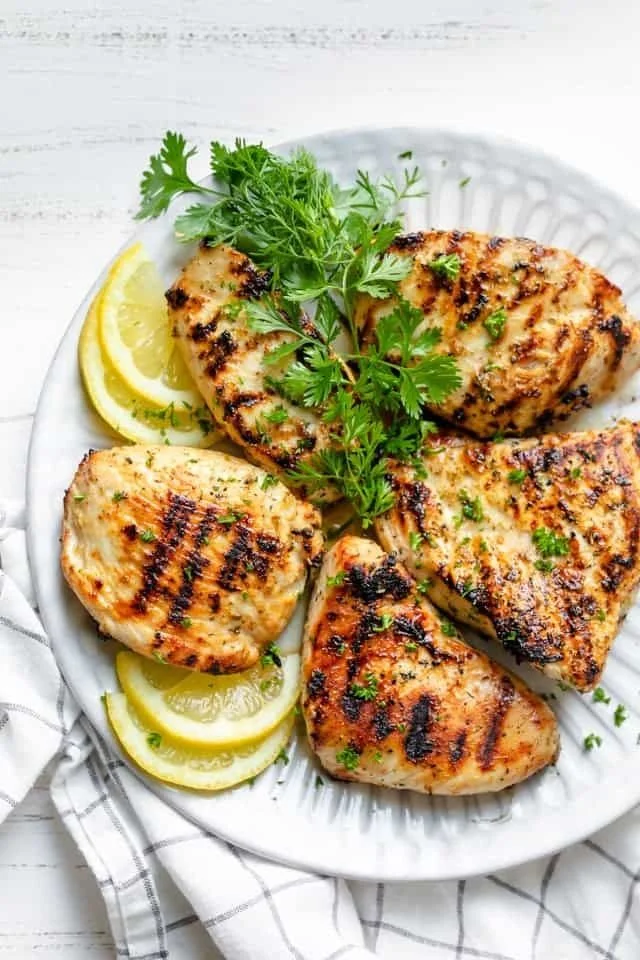
Ingredients:
- 4 boneless, skinless chicken breasts
- 1/4 cup fresh lemon juice
- 2 tablespoons olive oil
- 3 cloves garlic, minced
- 1 tablespoon chopped fresh rosemary
- 1 tablespoon chopped fresh thyme
- Salt and pepper to taste
Instructions:
- In a bowl, whisk together the lemon juice, olive oil, minced garlic, chopped rosemary, chopped thyme, salt, and pepper to make the marinade.
- Place the chicken breasts in a shallow dish or a resealable plastic bag. Pour the marinade over the chicken, ensuring that each breast is coated evenly.
- Cover the dish or seal the bag and refrigerate for at least 30 minutes to allow the flavors to meld and the chicken to marinate. You can also marinate it overnight for more flavor.
- Preheat your grill to medium-high heat.
- Remove the chicken breasts from the marinade and discard any excess marinade.
- Place the chicken breasts on the preheated grill and cook for about 6-8 minutes per side, or until they are cooked through and the internal temperature reaches 165°F (75°C).
- While grilling, you can baste the chicken with any leftover marinade to keep it moist and flavorful.
- Once the chicken is cooked through, remove it from the grill and let it rest for a few minutes before serving.
- Serve the grilled lemon herb chicken hot with your favorite sides, such as grilled vegetables, rice, or a fresh salad.
2. Quinoa Salad with Vegetables
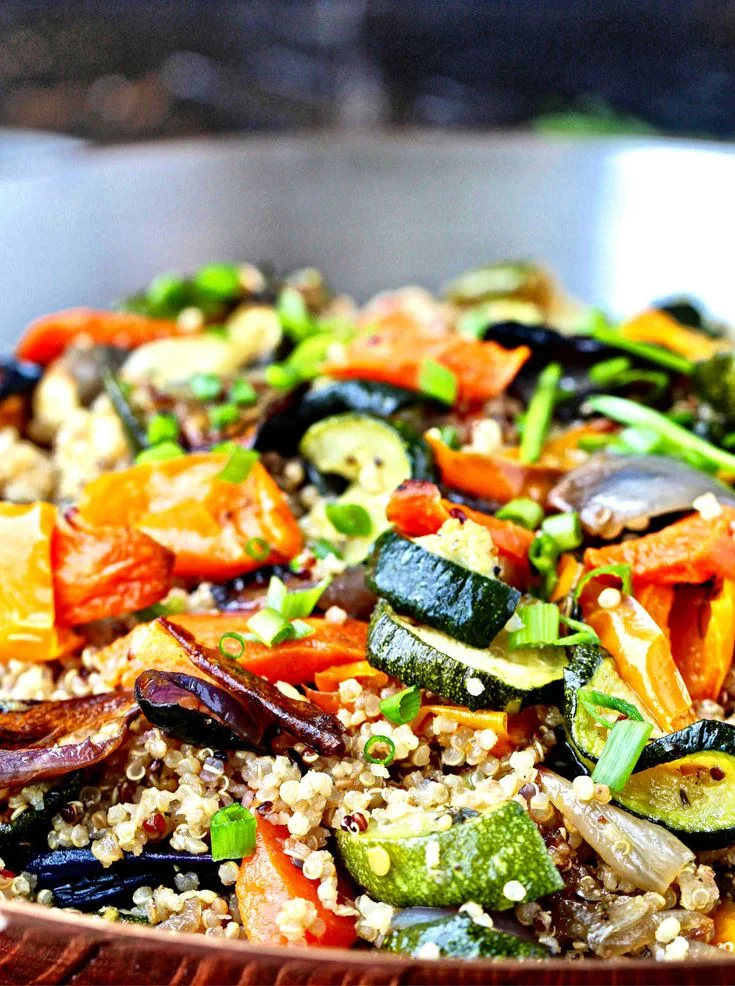
Ingredients:
- 1 cup quinoa
- 1 3/4 cups water or vegetable broth
- 1 cucumber, diced
- 1 cup cherry tomatoes, halved
- 1 bell pepper (any color), diced
- 1/4 cup red onion, finely chopped
- Juice of 1 lemon
- 2 tablespoons extra-virgin olive oil
- 2 tablespoons fresh parsley, chopped
- Salt and pepper to taste
Instructions:
- Rinse the quinoa thoroughly under cold water using a fine-mesh sieve to remove any bitterness.
- In a medium saucepan, combine the rinsed quinoa and water or vegetable broth. Bring to a boil over high heat, then reduce the heat to low, cover, and simmer for about 15 minutes, or until the quinoa is cooked and the liquid is absorbed. Remove from heat and let it sit, covered, for 5 minutes. Fluff the quinoa with a fork and transfer it to a large mixing bowl to cool.
- While the quinoa is cooking, prepare the vegetables. Dice the cucumber, halve the cherry tomatoes, dice the bell pepper, and finely chop the red onion. Add them to the bowl with the cooked quinoa.
- In a small bowl, whisk together the lemon juice, extra-virgin olive oil, chopped parsley, salt, and pepper to make the dressing.
- Pour the dressing over the quinoa and vegetables into the mixing bowl. Toss until everything is well coated.
- Taste and adjust the seasoning, adding more salt, pepper, or lemon juice if desired.
- Serve the quinoa salad immediately or refrigerate it for at least 30 minutes to allow the flavors to meld before serving. It can be served chilled or at room temperature.
- Garnish with additional chopped parsley before serving, if desired.
3. Baked Cod with Herbed Butter
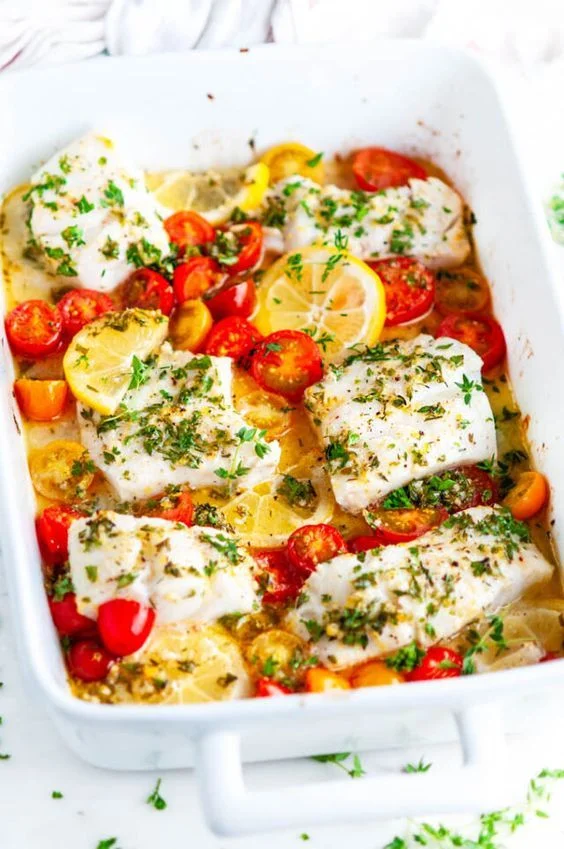
Ingredients:
- 4 cod fillets (about 6 ounces each)
- 4 tablespoons unsalted butter, softened
- 2 cloves garlic, minced
- 2 tablespoons fresh parsley, finely chopped
- 1 tablespoon fresh chives, finely chopped
- 1 tablespoon fresh dill, finely chopped
- Zest of 1 lemon
- Salt and pepper to taste
- Lemon wedges for serving (optional)
Instructions:
- Preheat your oven to 375°F (190°C). Line a baking dish with parchment paper or lightly grease it with cooking spray.
- In a small bowl, combine the softened butter, minced garlic, chopped parsley, chives, dill, and lemon zest. Mix until well combined. Season with salt and pepper to taste.
- Place the cod fillets in the prepared baking dish, leaving some space between each fillet.
- Divide the herbed butter mixture evenly among the cod fillets, spreading it over the top of each fillet.
- Bake the cod in the preheated oven for about 12-15 minutes, or until the fish is opaque and flakes easily with a fork. The cooking time may vary depending on the thickness of the fillets.
- Once the cod is cooked through, remove it from the oven and let it rest for a few minutes.
- Serve the baked cod with herbed butter hot, garnished with additional fresh herbs if desired, and lemon wedges on the side for squeezing over the fish.
- Enjoy your delicious and flavorful Baked Cod with Herbed Butter as a main dish, paired with your favorite sides such as steamed vegetables or roasted potatoes.
4. Stir-fried tofu with Mixed Vegetables
Ingredients:
- 14 oz (400g) firm tofu, drained and pressed
- 2 tablespoons soy sauce
- 1 tablespoon rice vinegar
- 1 tablespoon hoisin sauce
- 1 tablespoon sesame oil
- 1 tablespoon cornstarch
- 2 tablespoons vegetable oil
- 2 cloves garlic, minced
- 1 tablespoon ginger, minced
- 1 red bell pepper, sliced
- 1 yellow bell pepper, sliced
- 1 cup snap peas, trimmed
- 1 medium carrot, julienned
- 4 green onions, chopped (for garnish)
- Cooked rice or noodles, for serving
Instructions:
- Start by preparing the tofu. Cut the pressed tofu into cubes or strips, depending on your preference.
- In a small bowl, whisk together the soy sauce, rice vinegar, hoisin sauce, sesame oil, and cornstarch to make the sauce. Set aside.
- Heat 1 tablespoon of vegetable oil in a large skillet or wok over medium-high heat. Add the tofu cubes in a single layer and cook until golden brown and crispy on all sides, about 5-7 minutes. Remove the tofu from the skillet and set aside.
- In the same skillet, add the remaining tablespoon of vegetable oil. Add the minced garlic and ginger, and stir-fry for about 30 seconds until fragrant.
- Add the sliced bell peppers, snap peas, and julienned carrots to the skillet. Stir-fry for 3-4 minutes until the vegetables are crisp-tender.
- Return the cooked tofu to the skillet. Pour the sauce over the tofu and vegetables, and toss everything together until well-coated. Cook for another 1-2 minutes until the sauce thickens slightly.
- Remove the skillet from the heat. Taste and adjust the seasoning, adding more soy sauce or rice vinegar if desired.
- Serve the stir-fried tofu and mixed vegetables hot, garnished with chopped green onions. Serve with cooked rice or noodles on the side.
5. Turkey and Vegetable Soup
Ingredients:
- 1 tablespoon olive oil
- 1 onion, diced
- 2 carrots, diced
- 2 celery stalks, diced
- 2 cloves garlic, minced
- 1 teaspoon dried thyme
- 1 teaspoon dried rosemary
- 6 cups low-sodium chicken or turkey broth
- 2 cups cooked turkey, shredded or diced
- 1 cup green beans, trimmed and cut into bite-sized pieces
- 1 cup corn kernels (fresh, frozen, or canned)
- 1 cup peas (fresh or frozen)
- Salt and pepper to taste
- Chopped fresh parsley for garnish
Instructions:
- Heat the olive oil in a large pot or Dutch oven over medium heat. Add the diced onion, carrots, and celery. Cook, stirring occasionally, until the vegetables are softened, about 5-7 minutes.
- Add the minced garlic, dried thyme, and dried rosemary to the pot. Cook for an additional 1-2 minutes until fragrant.
- Pour in the chicken or turkey broth, scraping the bottom of the pot to loosen any browned bits. Bring the soup to a simmer.
- Once the soup is simmering, add the cooked turkey, green beans, corn kernels, and peas to the pot. Stir to combine.
- Allow the soup to simmer gently for about 15-20 minutes, or until the vegetables are tender and the flavors have melded together.
- Taste the soup and season with salt and pepper to taste.
- Ladle the turkey and vegetable soup into bowls. Garnish with chopped fresh parsley before serving.
- Serve the soup hot, accompanied by crusty bread or crackers if desired.
6. Lemon Garlic Shrimp Skewers
Ingredients:
- 1 lb large shrimp, peeled and deveined
- Zest and juice of 1 lemon
- 3 cloves garlic, minced
- 2 tablespoons olive oil
- 1 tablespoon fresh parsley, chopped
- 1/2 teaspoon salt
- 1/4 teaspoon black pepper
- Wooden skewers, soaked in water for at least 30 minutes
Instructions:
- In a bowl, combine the lemon zest, lemon juice, minced garlic, olive oil, chopped parsley, salt, and black pepper. Stir until well combined.
- Add the peeled and deveined shrimp to the bowl with the marinade. Toss the shrimp until they are evenly coated with the marinade. Cover the bowl and let the shrimp marinate in the refrigerator for at least 30 minutes, or up to 2 hours.
- Preheat your grill to medium-high heat.
- Thread the marinated shrimp onto the soaked wooden skewers, dividing them evenly among the skewers.
- Once the grill is hot, place the shrimp skewers on the grill grates. Grill the shrimp for 2-3 minutes per side, or until they are pink and opaque, and slightly charred on the edges. Be careful not to overcook the shrimp, as they can become tough and rubbery.
- Remove the shrimp skewers from the grill and transfer them to a serving platter.
- Garnish the shrimp skewers with additional chopped parsley and lemon wedges, if desired.
- Serve the Lemon Garlic Shrimp Skewers hot, either as an appetizer or as a main dish, accompanied by your favorite side dishes such as rice, salad, or grilled vegetables.
7. Roasted Vegetable Medley
Ingredients:
- 2 medium zucchinis, sliced into rounds
- 1 medium eggplant, diced
- 2 bell peppers (any color), sliced
- 1 pint cherry tomatoes
- 4 cloves garlic, minced
- 3 tablespoons olive oil
- 1 teaspoon dried thyme
- 1 teaspoon dried oregano
- Salt and pepper to taste
- Fresh parsley or basil for garnish (optional)
Instructions:
- Preheat your oven to 400°F (200°C). Line a baking sheet with parchment paper or aluminum foil for easy cleanup.
- In a large mixing bowl, combine the sliced zucchini, diced eggplant, sliced bell peppers, cherry tomatoes, and minced garlic.
- Drizzle the olive oil over the vegetables, then sprinkle with dried thyme, dried oregano, salt, and pepper. Toss the vegetables until they are evenly coated with the oil and seasonings.
- Spread the seasoned vegetables out in a single layer on the prepared baking sheet.
- Roast the vegetable medley in the preheated oven for 25-30 minutes, or until the vegetables are tender and starting to caramelize around the edges. Stir the vegetables halfway through the cooking time to ensure even roasting.
- Once the vegetables are roasted to your liking, remove them from the oven and transfer them to a serving dish.
- Garnish the roasted vegetable medley with fresh parsley or basil leaves, if desired, for a pop of color and flavor.
- Serve the roasted vegetable medley hot as a side dish or as a main course, accompanied by grains, pasta, or crusty bread.
8. Spinach and Mushroom omelet
Ingredients:
- 3 large eggs
- 1/4 cup milk (or water)
- 1 cup fresh spinach leaves, roughly chopped
- 1/2 cup mushrooms, sliced
- 1/4 cup onion, finely chopped
- 1 clove garlic, minced
- 1 tablespoon olive oil
- Salt and pepper to taste
- Shredded cheese (optional)
Instructions:
- In a small mixing bowl, whisk together the eggs and milk (or water) until well combined. Season with salt and pepper to taste. Set aside.
- Heat the olive oil in a non-stick skillet over medium heat. Add the chopped onions and minced garlic to the skillet and sauté for 2-3 minutes until the onions are translucent and fragrant.
- Add the sliced mushrooms to the skillet and cook for an additional 3-4 minutes, stirring occasionally, until the mushrooms are tender and lightly browned.
- Add the chopped spinach leaves to the skillet and cook for 1-2 minutes until wilted.
- Pour the beaten eggs evenly over the vegetables in the skillet. Tilt the skillet to spread the eggs evenly.
- Cook the omelet for 2-3 minutes, lifting the edges with a spatula and tilting the skillet to allow the uncooked eggs to flow to the bottom until the bottom is set and the top is slightly runny.
- If desired, sprinkle shredded cheese over one-half of the omelet.
- Carefully fold the omelet in half using a spatula and cook for an additional 1-2 minutes until the cheese is melted and the eggs are fully cooked through.
- Slide the omelet onto a plate and serve hot.
High-Potassium Vs. Low-Potassium foods
| High-Potassium Foods | Low-Potassium Foods |
|---|---|
| Bananas | Apples |
| Oranges | Berries (strawberries, blueberries, raspberries) |
| Kiwi | Pineapple |
| Avocado | Watermelon |
| Potatoes (white and sweet) | Cucumbers |
| Spinach | Lettuce (iceberg, romaine) |
| Kale | Bell peppers |
| Tomatoes | Cauliflower |
| Carrots | Broccoli |
| Sweet potatoes | Onions |
| Beans (lima, kidney, black) | Green beans |
| Lentils | Peas (green, snow) |
| Yogurt | Rice (white, brown) |
| Milk | Pasta (white, whole wheat) |
| Nuts (almonds, peanuts) | Bread (white, whole wheat) |
| Fish (salmon, tuna) | Chicken (skinless) |
| Beef | Egg whites |
| Pork | Cheese (mozzarella, cheddar) |
| Dark chocolate | Butter |
Note: The potassium content of foods can vary based on factors such as serving size, ripeness, cooking method, and processing. It’s essential for individuals with specific dietary needs to consult with a healthcare professional or registered dietitian for personalized dietary recommendations.
Summary
Overly elevated potassium levels are referred to as hyperkalemia. This may occur as a consequence of a health issue, drugs, or dietary supplements. In certain situations, reducing your potassium intake may be necessary as part of controlling hyperkalemia.
Food has a unique place in culture and festivities. You could enjoy certain foods that are high in potassium. Having selections with less potassium helps you appreciate your food more.
Consider consulting a nutritionist if you require more assistance when following a low-potassium diet.
FAQs
How to reduce potassium levels?
Try staying away from some salt replacements.
Steer clear of vitamins and natural cures
by taking potassium binders or water pills as prescribed by your doctor.
What lowers potassium quickly?
Can drinking a lot of water lower potassium?
References
- https://www.uptodate.com/contents/low-potassium-diet-beyond-the-basics (Benefits of Low-Potassium Diet)
- https://www.ncbi.nlm.nih.gov/pmc/articles/PMC7406842/ (Benefits of Low-Potassium Diet)
- https://www.medicalnewstoday.com/articles/287212 (Benefits of Low-Potassium Diet)
- https://www.hsph.harvard.edu/nutritionsource/potassium/ (Benefits of Low-Potassium Diet)
- https://www.ncbi.nlm.nih.gov/pmc/articles/PMC3650509/ (Benefits of Low-Potassium Diet)
- https://www.kidney.org/recipes-search (Low-Potassium Diet Recipes)
- https://www.thekidneydietitian.org/category/recipes/low-potassium/ (Low-Potassium Diet Recipes)
- https://www.webmd.com/food-recipes/low-potassium-diet-foods (High-Potassium And Low-Potassium foods)
- https://www.dietaryguidelines.gov/food-sources-potassium (High-Potassium And Low-Potassium foods)


